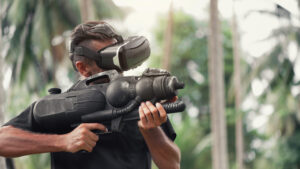xReality has a new name and a new game plan to target VR training for the military

.shock (iStock / Getty Images Plus) via Getty Images.
It’s been a big week for virtual reality and defence stock xReality Group (ASX:XRG) which changed its name from Indoor Skydive Australia (ASX:IDZ) on Monday.
Speaking with Stockhead, CEO Wayne Jones said the move made sense with the company’s acquisition of VR game developer Red Cartel in August and the goal to broaden its service offering away from indoor skydiving facilities to building physical and digital simulations.
“The main reason behind the Red Cartel acquisition was they have experience in building free roam virtual reality games,” he said.
“And they’ve got their own unique tracking system that they’ve developed in house; we can build unique games off the back of that.
“The other benefit of the Red Cartel acquisition was that they’d already built the main components of a military training system. They’ve been an absolute fantastic acquisition for the company.”
Pursuing military VR training was always the plan
Indoor skydiving is still on the cards, but Jones said the company is branching out further into military training applications – a move partly due to his own extensive experience in the Armed Forces.
“I served in the Australian military for 21 years and the last 15 years of that I was in the Special Air Service Regiment in Perth,” Jones said.
“When we first started the consumer experience side of virtual reality, in the back of our minds there was always going to be an application for the serious side to be able to push it into training and operations within the Defence Industry.
“Combining free roam virtual reality, integration of weapons and equipment and the ability to create buildings, rooms and environments, it just made so much sense to me with my background to take this technology into that space.”
Red Cartel was the push needed
Jones said that the Red Cartel acquisition was the perfect catalyst to be able to really develop and push that capability home.
“We’ve already finished building all the software behind the military tools, we’ve designed all of the hardware in-house, and we are now into the trials – we are doing that through small focus groups within the Special Forces units in Australia and the US,” he said.
“Once initial trials are complete, we will commence our go-to-market strategy on a global scale, initially through specialised military units followed by law enforcement organisations.”
Operator targets defence directly
“We’ve been working on a military solution for a while now and because of the way that the military and the defence supply chain works, we had to ring fence a separate company that met all of the security requirements to deal with the defence directly, and to also deal with the prime suppliers,” Jones said.
“Operator Tactical Solutions was established to be able to do meet these requirements. A ‘ring fenced’ company that houses all of the IP behind military, law enforcement, and enterprise suited systems.”
While there are a couple of companies in the VR space in defence, Jones said there’s nothing quite like his product.
Operator provides the end user with the ability to train and conduct mission rehersals using their own equipment combined with Operator’s hardware and software.
And Jones says that’s unique in the VR defence space.
“The way that we’re going to be applying our technology is going to be a game changer for global defence in my view,” he said.
“The mobility of our system is very unique and the way that we can integrate our technology into current service equipment is also very unique.
“We’re going to be offering something very different to what’s available at the moment on the market.”
End-user testing planned next year
The company is targeting end-user testing and evaluation for its Virtual Reality Tactical Trainer (VRTT), Mission Rehearsal System (MRS), and Weapons Integration System (WIS) in early-to-mid 2022.
VRTT basically allows soldiers to train Close Quarter Battle (CQB) tactics and techniques in any location – such as in transit on board ships, forward operating bases, or any other areas otherwise without appropriate facilities.
MRS uses in-house tools and third party data to simulate real world targets and environments, positive identification and specific threat integration, and Command, Control & Communications (C3) planning and rehearsals.
The idea is to allow rapid development of targets with live inputs to cater for time sensitive and detailed planning and rehearsals for operational environments.
And WIS allows soldiers to train on Operator’s OP-1 systems using their own weapons, integrating weapon tracking, shooting and configuration into the VR environment.
Operator will be publicly launching the products at the Military Communications and Information Systems (MilCIS) conference in Canberra on 22-24 February 2022.
FREAK in-house built game has been launched
Just last week XRG released its first in-house built game for its FREAK Entertainment business arm, which operates playing arenas in various shopping centres.
Using the latest VR technology, the multiplayer game does not require a backpack computer, and will be targeted toward younger audiences that typically can not play in the Arena due to the weight of the equipment and the theme of the game.
Cowboys vs Aliens will first pilot at FREAK Bondi in the December-January school holidays, then roll out to all venues in Q3 FY22.
The company plans to release a minimum of four games over the next 12 months, which it expects will deliver incremental value directly through lowering game licensing costs, broadening the customer demographic, and building company owned game IP.
Related Topics
UNLOCK INSIGHTS
Discover the untold stories of emerging ASX stocks.
Daily news and expert analysis, it's free to subscribe.
By proceeding, you confirm you understand that we handle personal information in accordance with our Privacy Policy.








